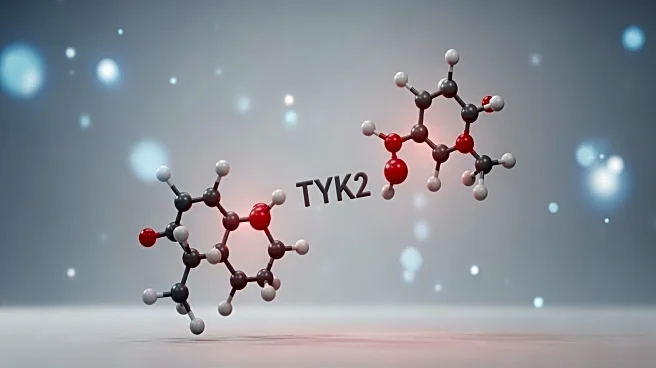What's Happening?
A webinar titled 'A Free Energy Perturbation (FEP) study: Identifying new, active ligands for TYK2' is scheduled to take place virtually on October 21, 2025. The event will focus on the application of Free Energy Perturbation (FEP) in drug discovery,
particularly in predicting ligand binding affinities for TYK2, a protein involved in immune response regulation. The webinar will present findings from both benchmark and blind production studies, demonstrating the efficacy of FEP in providing insights into drug discovery projects. The session aims to highlight the potential of FEP in enhancing the predictive capabilities of drug development processes.
Why It's Important?
The use of Free Energy Perturbation (FEP) in drug discovery represents a significant advancement in the field of biopharmaceutical research. By improving the accuracy of predicting ligand binding affinities, FEP can accelerate the development of new drugs, potentially leading to more effective treatments for diseases involving TYK2, such as autoimmune disorders. This technological advancement could streamline the drug development process, reduce costs, and increase the success rate of new drug candidates. The insights gained from this webinar could influence future research strategies and regulatory approaches in the biopharma industry.
What's Next?
Following the webinar, participants will have access to an on-demand recording, allowing for broader dissemination of the insights shared during the event. The application of FEP in drug discovery is expected to continue evolving, with further studies likely to explore its use in other protein targets. The biopharma industry may see increased adoption of FEP techniques, potentially leading to collaborations between research institutions and pharmaceutical companies to leverage this technology in drug development.
Beyond the Headlines
The integration of FEP into drug discovery processes could have long-term implications for the pharmaceutical industry, including ethical considerations related to drug testing and approval. As FEP enhances predictive accuracy, it may reduce the need for extensive animal testing, aligning with ethical standards for humane research practices. Additionally, the technology could democratize drug discovery by making advanced predictive tools more accessible to smaller research entities, fostering innovation across the industry.















